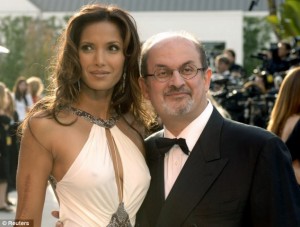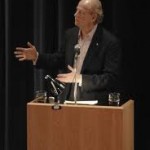In Canada, we have (steadily more meagre and occasionally even contemptuous) government-funded radio. Alarmists – unlike the always-judicious, ever-moderate me – might call the Canadian Broadcasting Corporation an endangered species. Last Chance to Hear! Broadcasters, Artists and Thinkers in Their Natural Habitat! It’s a pretty pale safari, but I’m on it. The CBC’s a national treasure.
Yesterday I listened to Q, Radio One’s flagship weekday arts ‘n’ culture show. It’s hosted by a grandson of Rwanda, a Canadian-as-socially-conscious-rap MC known as Shad. (By night, he’s a bouncy, smiling hip-hop groove-ster with a real band. By day, he talks to Salman Rushdie and Margaret Atwood and Darryl McDaniels, the DMC in rap/rockstar band Run DMC. In between, he’s Shadrach Kabango.) Actually, I was re-listening to an extended podcast recording of a conversation I’d heard part of earlier in the week. (I think I was sweeping. Or washing dishes?)
They were talking dystopias, especially regarding Rushdie’s new novel Two Years, Eight Months, and Twenty-Eight Nights. It’s full of malevolent genies, time travel, a corruption-exposing baby and a whole lot of thinly-disguised Now. It’s also apparently very funny, as Rushdie is no permanent pessimist and wanted to explore the “strangenesses” of our time with some inventive and comic strangeness of his own. He wasn’t trying to outgrim Margaret Atwood, in other words. (Though it must be said that her MaddAddam trilogy is nastily, wryly funny if you can suspend despairing recognition, at least for a moment.)
This was only the first (and then second) time I’d heard Rushdie interviewed, surprisingly, and I found him an engaging and generous interviewee.


